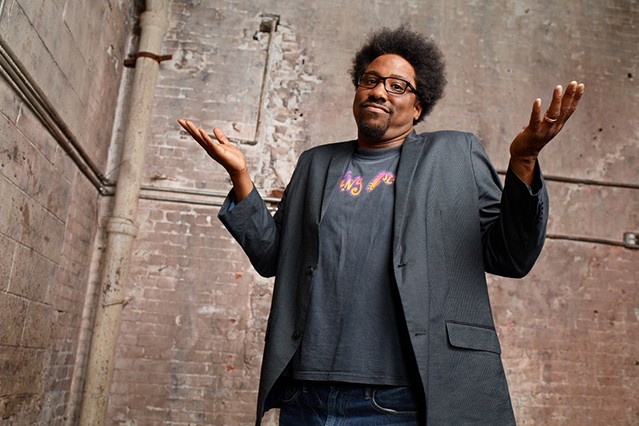The sad news came yesterday that Totally Biased, the late-night show hosted by comedian W. Kamau Bell first on FX and then on FXX, had been cancelled. Bell’s show began as a weekly program on FX, and as part of a larger experimentation with unabashedly liberal after-hours chat. The other entry in that project, Brand X With Russell Brand, never quite captured the charm and pointedness the British comedian’s displayed so well in prose and in indignant cable news appearances. It was cancelled after two seasons and twenty-six episodes, while Totally Biased at least survived the bifurcation of FX into two networks, one focused on drama, the other on comedy, and even earned an expansion into a nightly show. But that apparently wasn’t enough to draw viewers to another digit on the dial.
As frustrating as it is to see Totally Biased get that axe — and it is frustrating, whether you care about seeing someone other than white men on a late-night set, or whether you care to see an explicit political viewpoint expressed in late-night programming — the show’s death comes at an interesting moment for late-night programming. As the broadcast networks try to produce segments that will go viral the day after their late-night shows air, even as they preserve a narrow hosting pipeline that keeps the men in suits behind the desks looking awfully homogenous, Totally Biased was at least part of a larger experiment on cable to shake up who hosts, and what they do there.
Not all of these experiments are revolutionary, and some of them are decidedly creatively deadening. AMC has embraced a series of recap shows that air after its dramas, the punnily named Talking Dead and Talking Bad. Chris Hardwick, the multi-hypenate comedian who hosts both shows, leads energetic but not particularly deep discussions of what’s just aired, usually joined by either a celebrity super-fan of the program in question, or creative staff of the show. These shows mostly serve to cultivate hardcore fan enthusiasm for the show, and to capitalize on the popularity of written or podcasted recaps, which have become a staple of many television commentary sites. By design, they’re limited in their subject matter, and in their tone: they can’t really travel much beyond high-pitch enthusiasm.
AMC’s willingness to toss up these recap shows willy-nilly when a show seems to be a hit may seem profligate, but the network is actually following an earlier model. It was Andy Cohen of Bravo who pioneered the idea of recaps as a basis for a talk show with Watch What Happens Live, which began as a web series, migrated to Bravo’s airwaves, where it served as a platform for raising the profile of Bravo’s reality television personalities, including its Real Housewives, and then expanded to become a much wider-ranging program drawing a broader spectrum of entertainment industry guests. The show’s been so successful that, the same day Totally Biased was cancelled, Bravo announced that Watch What Happens Live had been renewed for two years, and that Cohen, who had served as a development executive for Bravo, would devote himself full-time to his hosting duties.
If Totally Biased added a distinctly African-American perspective and a dose of sharp, exasperacted leftism (in contrast to the liberal satire of The Daily Show and The Colbert Report) to late-night, Watch What Happens Live is, by design, both very gay and very goofy. One of the early conceits of Cohen’s show was that he’d drink and play games with his guests, adding a loose, louche atmosphere to the proceedings, which take place in a hilarious nightmare of a campy den. Especially as Cohen began pulling bigger and bigger guests, the fact that they were willing to come on Watch What Happens Live and drink with Cohen gave every interview a sense of intimacy, in conduct if not in content. The great central conceit of the show was that, even if a guest never said anything substantive at all, their willingness to go on Watch What Happens Live signaled a willingness to reveal their real selves, and to let go of some control.
Totally Biased had a different approach to its guest list, aiming to elevate voices who aren’t normally part of the late-night conversation, and provide a different framework for their discussions with those guests. That approach produced fascinating segments, among them Bell’s mediation between comedian Jim Norton and feminist commentator and comedian Lindy West. But it meant that Totally Biased had an inherently harder road to hoe than than Watch What Happened Live did. On Bravo, Cohen only shook up the perspective, rather than the preferred guest list, while Bell was trying to do both, distributing cultural capital to other people even as he was trying to build up his own reserves. And Watch What Happens Live had a built-in audience base in tying some but not all of its content to Bravo’s reality programming, while Totally Biased wasn’t built with a bridge to the FX comedies it was situated among.
To a certain extent, Andy Cohen’s whiteness and maleness makes him a much less dramatic transition from other late-night hosts than Bell’s relaxed style and race do. But the success of Watch What Happens Live and the cancellation of Totally Biased are a reminder that structural factors can determine whether shows that diverge from the late-night formula succeed or fail, too. I hope that FX won’t completely give up on building a different kind of late-night programming, and developing a different kind of late-night host, now that it’s decided that neither Brand nor Bell are working out for its family of networks. For the third time to be the charm, FX president John Landgraf might consider looking both to AMC and Bravo for cues on how to use his own programming as a springboard for late-night, without getting bogged down in a very different kind of formula.
